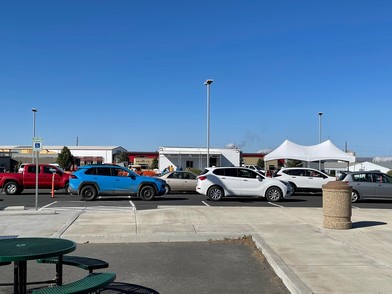For Oregonians who live and work in rural areas, getting to a COVID-19 vaccine site may be a challenge. To help make it easier, the Federal Emergency Management Agency (FEMA) sent a mobile vaccine unit (MVU) – along with eight FEMA vaccination support staff – to the state. The MVU team began its service April 5 in Boardman. Oregon Health Authority (OHA), Morrow County Public Health and FEMA, along with community partners like Oregon Rural Action, planned and staffed a multi-day vaccine event. In the first three days, more than 300 people in the Morrow County area were vaccinated.
OHA Field Operations Director, Kassie Clark, coordinated the event along with federal and local partners. “These events are truly a collaborative process with FEMA, the county, and community partners serving those who work and live in the county,” she said.
The MVU is fully equipped with refrigerated storage units and materials to assist clinics using any of the three authorized vaccines. The FEMA team will be assigned to mostly rural areas and specifically focused on reaching out to folks who work in agriculture and food processing.
After the Boardman clinic, pictured, the MVU team travels to Irrigon April 9 and 10, Heppner April 12 and 13, Malheur County April 16, and then Crook County.
Vaccinated with Pfizer-BioNTech or Moderna vaccines? Make sure to get your second shot
If you’ve gotten a Pfizer-BioNTech or Moderna COVID-19 vaccine, you’ll need a second shot before you are fully immunized. Getting a second shot will give you the most protection. You should get your second shot even if you have side effects after the first shot, unless a vaccination provider or your doctor tells you not to get it.
You may have had side effects from your first shot and don’t want to experience them again. Even though getting vaccinated may result in some discomfort, the side effects produced from vaccination are minor compared to those that can be produced from COVID-19. While side effects can be uncomfortable for a short time, they are not as difficult as actually having the illness. COVID-19 can cause severe illness which can lead to hospitalization and sometimes death.
Here’s what you need to know about getting a second shot:
- If you received the Pfizer-BioNTech COVID-19 Vaccine, you should get your second shot three weeks (or 21 days) after your first.
- If you received the Moderna COVID-19 Vaccine, you should get your second shot four weeks (or 28 days) after your first.
- Schedule your second shot at the same location as you got the first shot.
- If you missed the timeline for your second dose, you may still be able to receive it. Check with your vaccinator or health care provider.
For more information on second shots visit the Centers for Disease Control and Prevention (CDC) website.

Getting the COVID-19 vaccine won’t affect your immigration status
If you’re an immigrant, you may have concerns about getting the COVID-19 vaccine. Oregon Health Authority (OHA) believes that everyone should have the opportunity to be vaccinated. We want you to have the facts:
- All eligible people in Oregon can get the vaccine.
- You do NOT need to be a U.S. citizen.
- Getting the vaccine will NOT affect your immigration status or count as a public charge.
- You do not need to have or provide a social security number.
- You do not need to have identification.
If you need support or information on resources for help you can call the Safe + Strong Helpline: 1-800-923-HELP (4357).
Oregon Health Authority publishes COVID-19 variant dashboard
Starting today, the Oregon Health Authority is publishing a Tableau dashboard showing the cumulative count of SARS-CoV-2 variants of concern or variants of interest in Oregon. For additional information on COVID-19 variants, go here.
The dashboard will include a map of variant cases broken down by Oregon’s seven Hospital Preparedness Program Regions, along with a time series showing variant cases in Oregon by collection date. The dashboard will be updated weekly on Wednesdays and include data through the previous Saturday.
In order to provide a more comprehensive picture of variant circulation in Oregon, OHA will update its variant counts on the new dashboard using data from the GISAID Initiative — a publicly available scientific database for genetic sequences. This will allow OHA to rapidly report historical data whenever definitions of variants of concern or variants of interest are updated by the Centers for Disease Control and Prevention (CDC).
On March 16, the CDC reclassified the B.1.427 and B.1.429 variants as variants of concern. These variants have been circulating in Oregon since late 2020 and had not been previously reportable.
Oregon will continue to ask all laboratory partners to promptly report all variants of concern (B.1.1.7, B.1.351, P.1, B.1.427 and B.1.429) and variants of interest (B.1.525, B.1.526 and P.2) to public health authorities in order to inform case investigation and contact tracing.



